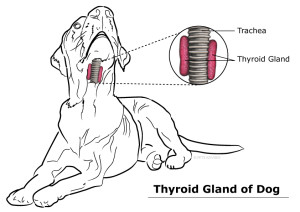Basenjis over diagnosed for hypothyroidism – Update on Basenji Thyroid Research – Dr Aine Seavers
In 2006 research began which encompassed testing 113 Basenjis of various ages and sex including de-sexed individuals. The research concluded that Basenjis have a similar reference range for serum Thyroid Stimulating Hormone (TSH) to other dog breeds but considerably lower Thyroxine (TT4). That taken alone, TT4 levels have limited benefit in determining thyroid function. That it is essential to review the TT4 along with the TSH levels. In the Basenji a low TT4 level does not necessarily indicate a candidate for thyroid dysfunction. Unfortunately, many labs at the time were not testing TSH levels and therefore many Basenjis that were tested as being low TT4 were placed on thyroid medication. Based on the breed specific reference ranges and the research conclusions, almost certainly many cases diagnosed with thyroid dysfunction may have been medicated for no reason. Analysis of cholesterol is also of benefit in thyroid function diagnosis.
Quote “Importantly, it is recommended that thyroid function tests should only be performed in dogs with actual clinical signs consistent with hypothyroidism. The situation is thus further complicated when a specific breed society decides to screen breeding stock for hypothyroidism on the basis of an alleged inherited basis for the condition. Driven by ‘abnormal’ results based on inappropriate laboratory reference intervals, which do not take breed differences into account, a situation may arise in which healthy individuals are unnecessarily removed from the gene pool on the basis of such testing.” End Quote
Dr Seavers has provided the following update on Basenji Thyroid Research:
There is a new paper coming out on our work with thyroid in Basenji – due September.
It proves our long held belief that Basenji react differently to many drugs – some they over respond to – like Thyroxine and that can cause suffering which is the basis of our paper and others perhaps like miss-mating injections that they under respond to and end up with litters.
With 5 international vet text books now citing our 2006 work on correct thyroid testing screens and need to avoid over diagnosis of hypothyroidism in the breed, it would appear our work on blood tests is now accepted and is the standard reference work.
Hopefully the Sept paper will become the standard for drug therapy and drug doses as well.
VBBA members are encouraged to seek a second opinion should they have any doubt about thyroid analysis results. And the VBBA recommends that your Basenjis cholesterol level be analysed in conjunction with any thyroid analysis.
MAY
2015

